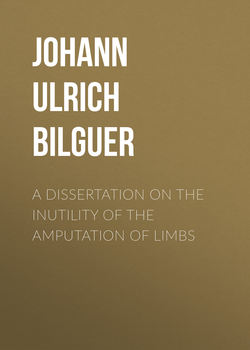Читать книгу A dissertation on the inutility of the amputation of limbs - Johann Ulrich Bilguer - Страница 3
PREFACE,
ОглавлениеBy Dr. TISSOT
An extract of the Dissertation, of which I now publish a Translation, had given me a very high opinion of it; but on a perusal of the whole, I found it still better than I had imagined: It seemed to me one of the most useful and best executed performances on Surgery, and I hoped it would very soon be translated into French.
Eighteen months having elapsed without any such translation appearing, I thought of procuring one. I then endeavoured to find a translator, but failing in that, I determined to do the office my self. I imagined, that, in thus dedicating a few hours of my time to this work, I should do a considerable service to many unfortunate people. I shall rest well satisfied if, by rendering this excellent book more common, I prove the means of adding to its influence, and of inducing a great number of surgeons, who may now read it, to quit the cruel and fatal practice of amputation, for the method which Mr. Bilguer proposes, with a degree of sincerity and precision which leaves no room for doubt.
The title of the original is, Dissertatio inauguralis medico-chirurgica, de membrorum amputatione, rarissime administranda aut quasi abroganda, quam, pro gradu doctoris medecinæ et precipue chirurgiæ rite consequendo, die vigesima una Martii, A. S. 1761. In alma Regia Fridericiana speciminis loco, publicæ eruditorum censuræ submisit, Johannes Ulricus Bilguer, curia-rhœtus generalis præfectus chirurgorum exercitûs regii Borussici.
This work contains a much greater variety of matter than its title implies, for it not only shews the inutility and danger of amputation, by several arguments, to which many others might be added; but not satisfied with levelling a tottering edifice, Mr. Bilguer frames and describes a plan for preventing and curing those accidents, which oblige surgeons to have recourse to amputation; and this is properly the most considerable and most essential part of the performance, which is, in fact, a treatise on gunshot wounds.
I have scarcely done Mr. Bilguer justice with regard to style: I hope, however, I have given his meaning, without depriving it of its perspicuity or strength. This work will begin a new æra in Surgery, and will reach posterity. I should have been sorry in any shape to have disfigured it.
It will give me very great pleasure, if the pains I have taken, and the notes I have added, prove agreeable to the author. He may be convinced that, being engaged in business as I am, his performance must have appeared to me extremely well executed, and much wanted, before I undertook to translate it.
I am informed he has lately published a work on Surgery, in the German language; I am persuaded it contains much valuable matter: He seems to me to have a genius for discovering new expedients to lessen the sufferings of human kind. I would have given this book the title of a Manual for the Surgeons of the Army, which it deserves to be, were there not already another so called1, which, although very little known, is by no means contemptible. The author had, even at that time, remarked that wounds of the tendons are not troublesome, owing to their want of sensibility, that the actual cautery is seldom proper; and some other facts, almost forgotten since that time. He describes wounds near the articulations with dislocation and fracture, he points out the accidents attending gunshot wounds, and, what deserves notice, he only admits of amputation in one case; namely, that of an incurable mortification, and mentions it as a cruel and doubtful expedient. I shall here cite his own words; they plainly shew that, if he lived in our time, he would be one of the most zealous encouragers of the new method, since he was so sensible of the defects, and grieved at the barbarity of the old. “If, unfortunately,” says he, “a mortification, from whatever cause it proceeds, gains ground in such a manner as to baffle all our care and applications, there is then no expedient left but that of taking off the limb; the success of which is very uncertain, for if it be dubious in a healthful subject, it must be much more so in one which is otherwise: It is, however, the only method, dreadful as it is, of putting astop to the ailment, and saving the rest of the body. This nevertheless ought not to be done, except when the consent, age and strength of the patient permit us to try so dangerous an experiment.”
This author's manner of thinking is very far from being established as might be wished, amputations being still too frequent. Mr. Bilguer's work ought at this time to be so much the more favourably received, as a celebrated company, whose decisions ought to have great weight in matters relating to surgery, has formally declared, about seven years ago, That amputation is absolutely necessary in gunshot wounds, complicated with fracture of the bones; and have left unfortunate wounded men no other alternative, but that of losing the injured limb on the spot, or a few hours later. That line of Juvenal seems very applicable on the occasion:
Nulla unquam de morte hominis cunctatio longa est.
1
Le Manuel du Chirurgien d'Armée; or, The Art of methodically curing Gunshot Wounds, &c. By L. L. M. C. Printed for Houry, at Paris. My edition is the second, published 1693.
